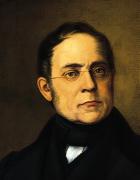Carl Czerny Biography - A Very Quick Guide
Artist:
Carl Czerny
Born:
February 21, 1791
Died:
July 15, 1857
Carl Czerny (sometimes Karl; February 21, 1791 – July 15, 1857) was an Austrian pianist, composer and teacher. He is best remembered today for his books of etudes for the piano.
Czerny was born in Vienna and was first taught the piano by his father before taking lessons from Johann Nepomuk Hummel, Antonio Salieri and Ludwig van Beethoven. He was a child prodigy, making his first appearance in public in 1800 playing a Mozart piano concerto. Later, he gave the Vienna premiere of Beethoven's Piano Concerto No. 5 (Emperor) in 1812.
He quickly took to teaching and by the age of fifteen, he was already a sought after instructor. He eventually instructed Franz Liszt, among many others. Liszt later dedicated his twelve Transcendental Etudes to Czerny, who was one of the first composers to use Etude ('study') for a title.
Czerny also composed a very large number of pieces, including a number of Masses and Requiems, and a large number of symphonies, concertos, sonatas and string quartets. None of these pieces are often played today, however, and he is known as a composer almost exclusively because of the large number of didactic piano pieces he wrote, many of which are still used today.
Czerny was born in Vienna and was first taught the piano by his father before taking lessons from Johann Nepomuk Hummel, Antonio Salieri and Ludwig van Beethoven. He was a child prodigy, making his first appearance in public in 1800 playing a Mozart piano concerto. Later, he gave the Vienna premiere of Beethoven's Piano Concerto No. 5 (Emperor) in 1812.
He quickly took to teaching and by the age of fifteen, he was already a sought after instructor. He eventually instructed Franz Liszt, among many others. Liszt later dedicated his twelve Transcendental Etudes to Czerny, who was one of the first composers to use Etude ('study') for a title.
Czerny also composed a very large number of pieces, including a number of Masses and Requiems, and a large number of symphonies, concertos, sonatas and string quartets. None of these pieces are often played today, however, and he is known as a composer almost exclusively because of the large number of didactic piano pieces he wrote, many of which are still used today.
Top Pieces on 8notes by Carl Czerny
30 Studies Op.849 No.26
10 Petits Rondeaux, Op.316
100 Progressive Recreations
100 Progressive Studies, Op.139
12 Rondinos faciles et doigtes sur des motifs favoris, Op.593
125 Passagenubungen, Op.261
14 Ecossaises brillantes, Op.174
160 kurze Ubungen, Op.821
18 Petits rondeaux et variations sur des melodies populaires allemandes, Op.606
10 Petits Rondeaux, Op.316
100 Progressive Recreations
100 Progressive Studies, Op.139
12 Rondinos faciles et doigtes sur des motifs favoris, Op.593
125 Passagenubungen, Op.261
14 Ecossaises brillantes, Op.174
160 kurze Ubungen, Op.821
18 Petits rondeaux et variations sur des melodies populaires allemandes, Op.606
